Business
HAWUL AT A GLIMPSE 1
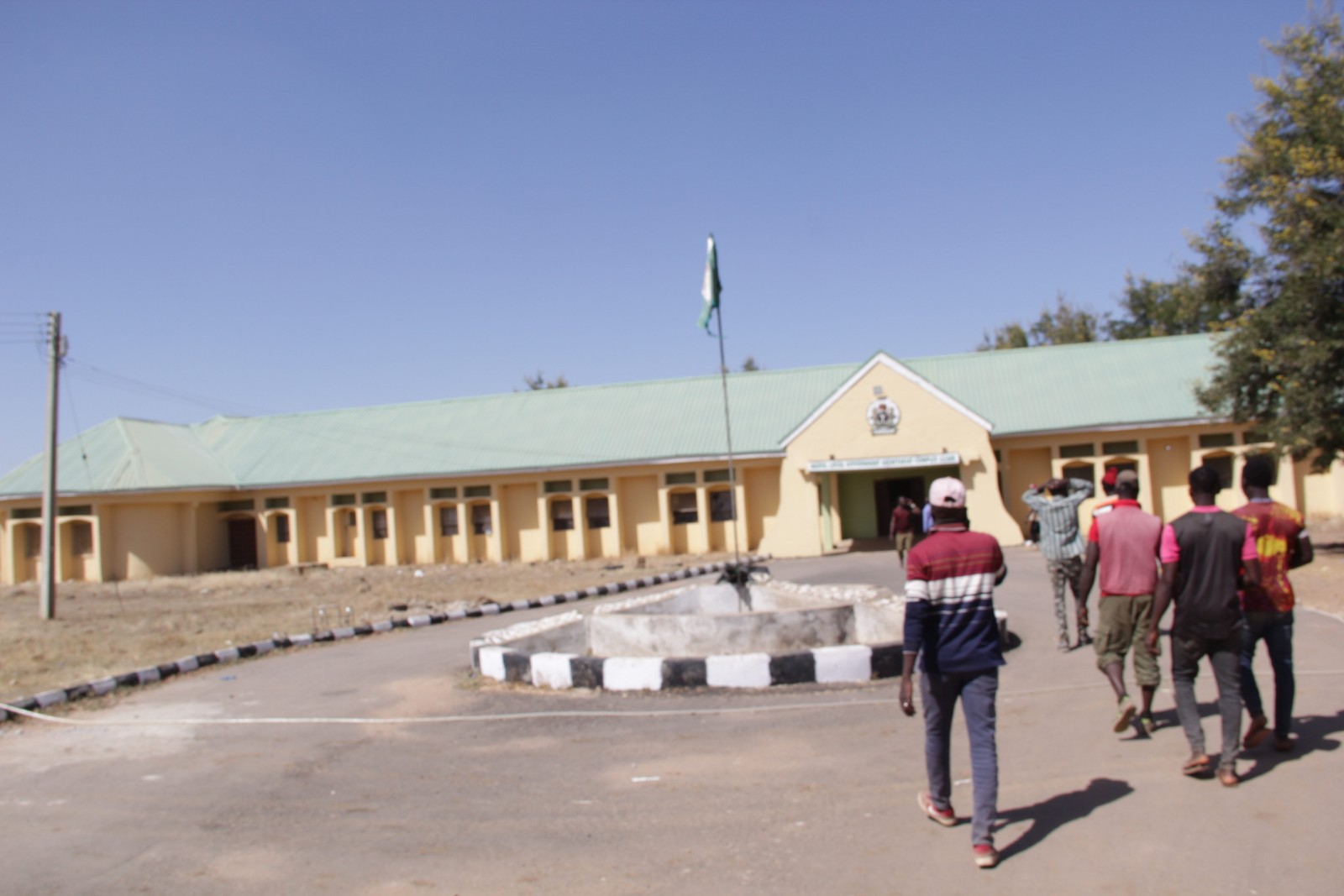
by Inuwa Bwala
By the time I depart as the Chairman of Hawul Local Government Area of Borno state, I may have garnered enough imputes to write about the enclave and her people.
But I want to start with a glimpse at the jinx that surrounded Azare, the local government headquarters, and how it is being broken.
Created in 1991 along with other local government areas across the country, Hawul Local Government Area of Borno state has an interesting and intriguing history behind it.
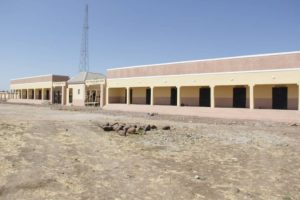
Prof Babagana Unara Zulum Arena and shopping complex, completed.
Perhaps the most intellectually sophiscated, productively ingenious, culturally boisterous, highly industrious but politically unpredictable and sadly developmentally retarded untill recently, of all the Local Governments.
Azare, the local government headquarters, even as the face of the local government, has been a glorified village: bereft of facilities that qualify it as centre of attraction.
There might never have been a conscious effort to develop it, in the erroneous belief that one day the local government may be split and Azare may revert to a virtual nomans land.
All the main towns, which serve as ward centres of the 12 wards in Hawul, are far ahead of Azare the Local Government headquarters, in terms of infrastructure and population.
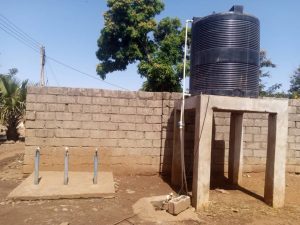
Water point. Katsina close to Lawan Birma Residence
All the elites from Hawul, including me, prefer to concentrate our development efforts in our immediate towns or in Biu, the largest town in southern Borno, at the expense of Azare.
Workers posted to Azare prefer to take up accommodations in surrounding towns, in the absence of beffiting houses to rent in Azare.
The few Government built houses have given way under consistent wind and rainstorms in the face of poor maintenance culture.
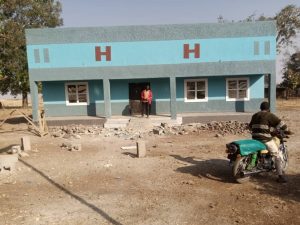
Eng. Ibrahim Idris Garba Memorial Clinic, Ngwa, completed.
For over forty years, the citizens were often sold the gimmick that there was no water fllowing underneath the earth in Azare.
At a point, attempts were made to lay pipes from other communities into Azare, all in an attempt to further mystify the water story.
Indeed, the social media was awash with stories of people ferrying water from valleys into Azare; long after the jinx had been broken.
The water story in Azare was deliberately orchestrated to score political points and to further portray the town as unsuitable for citting the headquarters of Hawul.
The only road, which is a federal highway that passes through Azare from Biu to Gombi, is a virtual death trap.
Travellers plying the road are at the mercy of so many odds. Communities along the road tell stories of lamentations of neglect and deprivations.
The stories sounded rather too scary when I was asked to go and change the narratives; first, as a transition chairman and later as a caretaker chairman.
Coupled with the task of midwifing an election that was tension soaked, the assignment at first looked impossible.
I was torn between having to convince a population that was hoodwinked into believing my party was a bad product, and having to work against a hypocrisy that wanted me to fail, even as members of my party, and further thinking of giving water to the Azare community that believed there was no water under their own soil, the task looked daunting.
So, in the first four weeks of my assumption of duty, when the Governor, Professor Babagana Umara Visited and looked at me straight in the eyes and before the Azare community, ordered me to provide water to Azare-Tasha, I was at my wits end how to do it.
It was rather baffling that a few meters away from the community water was flowing from a borehole within a Church premises, but for the community, the story was different. But then, I took up the challenge and punched the first two sites without success. On a third trial, water started gushing out at less than a hundred meters. That water still flows: in a community that was told to resign their fates.
That feat began to break the water jinx. Since then, any visitor to Azare in the last one year should be telling a different story from the gory picture painted above.
Today, there are not less than 30 functional water boreholes in Azare; all oozing out water, for human and animal consumption, and even gardening.
We immediately embarked on massive borehole repairs beyond Azare; including private and public borehole, j6st to gather goodwill. We drilled new ones in other locations, all of which only marginally impacted the usually unpredictable lot.
Again, when we looked around, the local government secreteriat, where I was expected to operate, was in tatters. Staff morale was down, and there were no companies with whom to work, as they seldom come around.
To attract life back into the secreteriat, we opened a staff register in each department and ordered workers to sign in on reporting to duty and to sign out at the close of work.
That trick worked out as every worker immediately reported to work, and we started having people around whom we assigned to do jobs of bringing life into the secreteriat.
We commenced distributing palliatives to attract attention and even resorted to nocturnal visits in the community to win over friends.
We could not do much to Azare enough to change the narrative in the first stanza, but we were able to prove that the story about water under their soil was a mere facade.
Today, Azare is beggining to wear a new look, courtesy of a few structural developments, we undertook.
The local government secreteriat wears a new look after the rainstorm disaster of 23 May, 2023, that brought down walls and blew off roofs.
We have restored electricity, we have built an arena, with a shopping arcade to attract commercial activities to the town, we have completed a seven room befitting lodge for visitors, we built a central store and repaired parts of the collapsed Federal highway.
Business
Dangote Refinery Boosts Fuel Exports as Gulf Refineries Shut Down

By: Fabian Apechihin
The Dangote Petroleum Refinery has ramped up fuel exports to international markets amid widespread refinery shutdowns in the Middle East, industry sources confirmed.
A senior official at the $20bn Lagos-based plant told The PUNCH that the facility exported significant volumes of petrol (PMS), diesel (AGO), and aviation fuel (Jet A1) to foreign buyers in August, following earlier shipments in June and July.
The surge comes as Saudi Aramco and other regional producers face heavy maintenance schedules, tightening fuel supply. Aramco has already shut down two plants and plans further closures, including its 460,000 b/d Satorp refinery in Jubail for a 60-day turnaround in November–December. Kuwait and India are also scaling back capacity for maintenance and seasonal demand.
According to Argus Media, these shutdowns are pushing Gulf nations to import record volumes of gasoline, with Saudi Arabia and the UAE sharply increasing purchases from Europe and other markets in recent months.
While some reports pointed to operational constraints at Dangote’s 650,000 b/d facility, the company dismissed such claims, insisting production is on track to reach 700,000 b/d by December. Earlier this year, Aliko Dangote announced the refinery had sold two cargoes of jet fuel to Saudi Aramco and recently achieved exports of about 1 million tonnes of petrol between June and July.
“With Gulf refiners offline, Nigeria has now emerged as a net exporter of refined products,” Dangote said.
Analysts suggest the extended refinery outages in the Middle East will further strengthen demand for Dangote’s output, positioning the Nigerian plant as a key supplier in regional fuel markets.
Would you like me to tighten this further into a 5–6 paragraph wire-style news brief, or keep it as a detailed feature-style report with more context on Gulf refinery shutdowns?
Business
US Oil Exports to Nigeria, Others Fall to 3.3m bpd as Local Output Rises

By: Fabian Apechihin
The United States’ crude oil exports to Nigeria and other African countries fell for the fifth consecutive month in July 2025, averaging 3.3 million barrels per day (bpd), the lowest level since March 2022.
The Organisation of Petroleum Exporting Countries (OPEC) disclosed this in its August 2025 Monthly Oil Market Report (MOMR), attributing the decline to weaker flows to Europe and Africa, particularly Nigeria, but without giving further details.
Industry analysts link the slowdown to the ramp-up of local refining capacity, especially the 650,000 bpd Dangote Refinery, which has reduced Nigeria’s reliance on imported crude, including from the US. Vanguard checks also show that crude importation has slowed further in recent months due to improved domestic production.
According to OPEC data, Nigeria’s crude oil output—excluding condensates—rose by 11 per cent year-on-year to 1.559 million bpd in July 2025, up from 1.386 million bpd in the same period of 2024. This marks the country’s highest monthly production level so far this year.
The Nigerian Upstream Petroleum Regulatory Commission (NUPRC) corroborated the figures, stating that overall output, including condensates, exceeded 1.8 million bpd in July.
Gbenga Komolafe, Chief Executive of the NUPRC, said the milestone was achieved through the agency’s “Project 1 MMBOPD Incremental” initiative, supported by a multi-stakeholder collaborative framework.
“We are glad to report that we crossed the 1.8 million bpd mark on peak production last month, with average production hovering at 1.78 million bpd,” Komolafe stated.
He added that the Commission is working to sustain production growth by optimising the Maximum Efficient Rate (MER) framework, improving produced water management, and aligning operational shutdowns and maintenance schedules to minimise disruptions.
“With these measures and continued collaboration, the presidential mandate on production increase is well within reach,” he said.
Do you want me to make this rewrite more concise for a newspaper front-page brief or keep it detailed like a full energy market report?
Business
NDYPC Hails Otuaro’s Reforms in Presidential Amnesty Programme
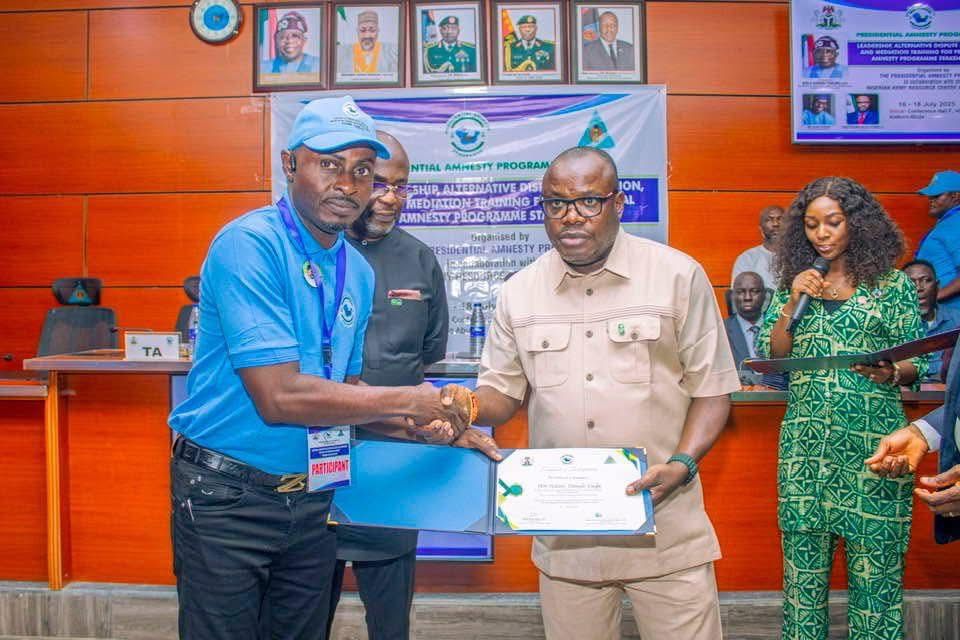
• Lauds transparency, fairness in beneficiary selection and grassroots empowerment
• Says reforms align with Tinubu’s Renewed Hope Agenda, restore trust in Niger Delta
The Niger Delta Youths for Positive Change (NDYPC) has commended the Administrator of the Presidential Amnesty Programme (PAP), Dr. Dennis Otuaro, for what it described as bold, people-focused reforms that are restoring trust and delivering tangible benefits to the Niger Delta.
In a statement signed and issued by Comrade Elliott Yibakeni, after the conclusion of leadership training sessions with ex-agitator leaders in Abuja, the group said the PAP, once in urgent need of renewal, is now undergoing a transformation that reflects transparency, fairness, and accountability.
“At a time when public trust in institutions was waning, Dr. Otuaro has emerged as a symbol of credibility and transformation,” the statement read. “His visionary leadership is restoring integrity, empowering communities, and driving a sustainable development agenda that resonates with the aspirations of the Niger Delta.”
According to NDYPC, under Otuaro’s leadership, beneficiary selection has become fair and merit-based, ending years of favoritism and political interference. The group added that access to education, skills training, and empowerment opportunities, both locally and abroad, is now guided by equity and open competition.
The group highlighted several internal reforms, including improved staff welfare, strengthened professional capacity, and strict adherence to best practices in public procurement. These, it said, have made the PAP more efficient, responsive, and transparent.
NDYPC also praised Otuaro’s inclusive governance style, noting his sustained engagement with traditional rulers, women leaders, civil society organizations, and local communities. This approach, the group said, has strengthened peace-building efforts and deepened trust between the PAP and the people it serves.
In line with President Bola Ahmed Tinubu’s Renewed Hope Agenda, the PAP has maintained consistent payment of stipends to ex-agitators and extended direct support to vulnerable populations. NDYPC also applauded new healthcare interventions for ex-agitators facing health challenges.
The statement further commended the programme’s investments in scholarships, vocational training, and economic empowerment initiatives aimed at preparing Niger Delta youths for leadership, innovation, and sustainable livelihoods.
“Every decision reflects a deep commitment to public trust, responsible stewardship, and long-term development,” NDYPC stated. “Under Dr. Otuaro’s watch, the Niger Delta is rising stronger, united, and filled with renewed hope.”
-

 Uncategorized5 years ago
Uncategorized5 years agoFG, states urged to harness flooding for ranching, others with technology – Agbaje
-

 Headlines10 years ago
Headlines10 years agoBreaking: EFCC seals Borno House of Assembly, as Hon members take to their heels
-

 News11 years ago
News11 years agoNigeria Security Operatives Stage Manhunt For Homosexual Perpetrator
-

 News9 years ago
News9 years agoHow 21-year-old Girl fled community over accusation of lesbianism
-

 News10 years ago
News10 years agoYobe Gov Moves Against Deputy
-

 Opinion7 years ago
Opinion7 years ago7 signs she has friend zoned you
-
Technology4 years ago
Online job placement company headhunts women
-

 Headlines10 years ago
Headlines10 years agoBorno Dep Gov Abducts Another Church Leader





